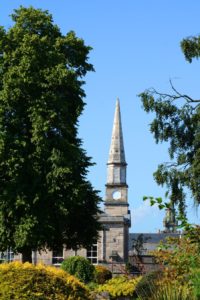The Supreme Court of New Jersey recently held oral arguments in two cases regarding whether the New Jersey Constitution bans government agencies from giving grants to local churches. The cases are Freedom from Religion Foundation v. Morris County Board of Chosen Freeholders and American Civil Liberties Union of New Jersey v. Hendricks.

New Jersey Constitution
The New Jersey Constitution includes several provisions that address the separation between church and state. Article 1, Paragraph 3 of the New Jersey State Constitution provides that no person shall be obliged “to pay tithes, taxes or other rates for building or repairing any church or churches, place or places of worship, or for the maintenance of any minister or ministry, contrary to what he believes to be right or has deliberately and voluntarily engaged to perform.”
Awarding Historic Preservation Funds to Churches
In Freedom from Religion Foundation v. Morris County Board of Chosen Freeholders, the Freedom From Religion Foundation (FFRF) alleged that the Morris County Freeholders violated Article 1, Paragraph 3 by providing Morris County Preservation Trust Fund grants to local churches. The Complaint asked the court to declare that each of defendants’ “grants of taxpayer funds to churches,” made during the two years prior to December 1, 2015, violated the New Jersey Constitution. The Complaint further requested the Court to enjoin defendants from “offering taxpayer money to any church” in the future.
In January, Superior Court Judge Margaret Goodzeit dismissed the lawsuit. “Just because the religious groups have put Morris County on notice that they intend to use their churches for worship does not mean that Morris County is somehow inextricably entangled with religion,” the judge concluded. Judge Goodzeit further highlighted that Morris County relies on neutral criteria when determining whether applicants are eligible for historic preservation grants. “Morris County desires to sustain historic landmarks, not just historic churches,” she wrote. The New Jersey Supreme Court granted the Morris County Freeholders’ request to bypass the Appellate Division and proceed directly before the state’s highest Court.
In oral arguments before the New Jersey Supreme Court, counsel for the FFRF argued: “The government is not allowed to repair churches. There are no exceptions for public purposes.” The FFRF further argued that the building is “essential to the pursuit of religion” and that it did not matter than voters had approved the grant. In response, the attorney for the county maintained that the purpose of the funds was “extremely nonsectarian,” emphasizing that the purpose is to preserve buildings.
Awarding Educational Grants to Sectarian Schools
In American Civil Liberties Union of New Jersey v. Hendricks, the American Civil Liberties Union of New Jersey (ACLU-NJ), the Unitarian Universalist Legislative Ministry of New Jersey (UULM-NJ), and three individuals challenged the Department of Higher Education’s award of public grants to two sectarian institutions of higher education. Specifically, the plaintiffs contested two grants for capital improvements totaling over $10 million the Department awarded to Beth Medrash Govoha (the Yeshiva), and three grants totaling $645,323 it awarded to Princeton Theological Seminary (the Seminary).
The plaintiffs specifically alleged that the grants violate Article I, Paragraph 3 of the New Jersey Constitution because the recipients will use the grant funds to support religious instruction, including the preparation of candidates for ministries respectively in the Jewish and Christian faiths. The Appellate Division concluded that the New Jersey Supreme Court’s opinion in Resnick v. East Brunswick Township Board of Education, 77 N.J. 88 (1978), which construed Article I, Paragraph 3 to bar public schools from allowing religious organizations to use their school facilities in the evenings and on weekends for religious instruction unless the users fully reimburse the public for the costs of providing such access, compelled the invalidation of the grants of public funds to the Yeshiva and the Seminary.
In its opinion, the Appellate Division acknowledged that the intended meaning of Article I, Paragraph 3 is “not entirely clear.” The appeals court left it to the state’s highest court to consider whether the arguments presented by the parties as to the meaning and history of the clause warrant a reexamination of Resnick.
In oral arguments in the second case, Assistant Attorney General Stuart Feinblatt urged the court to overturn the Appellate Division decision, arguing that the funds are intended to assist students in pursuing an education in their secular field of study. “The grants are designed to improve the educational experience as they move on through institutions of higher education,” said Feinblatt. “We’re hoping to reduce outward migration.” In response, the ACLU-NJ’s legal director argued that the ultimate purpose of the grants is irrelevant. “There is a distinct prohibition on the use of taxpayer funds” to assist sectarian-based educational institutions, he stated.
For more information about the cases before the New Jersey Supreme Court or the legal issues involved, we encourage you to contact a member of Scarinci Hollenbeck’s Government Law Group.
